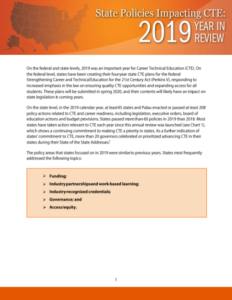 On the federal and state levels, 2019 was an important year for Career Technical Education (CTE). In addition to creating their four-year state plans for the federal Strengthening Career and Technical Education for the 21st Century Act (Perkins V), at least 45 states and Palau enacted at least 208 policy actions related to CTE and career readiness.
On the federal and state levels, 2019 was an important year for Career Technical Education (CTE). In addition to creating their four-year state plans for the federal Strengthening Career and Technical Education for the 21st Century Act (Perkins V), at least 45 states and Palau enacted at least 208 policy actions related to CTE and career readiness.
Today, Advance CTE, the Association for Career and Technical Education (ACTE) and the Education Commission of the States released the seventh annual State Policies Impacting CTE: Year in Review report, examining 2019 legislative activity, including legislation, execution orders, board of education actions and budget provisions. To develop the report Advance CTE, ACTE and Education Commission of the States reviewed state activity, cataloged all finalized state action and coded activity based on the policy area of focus. In 2019, states most frequently addressed the following topics:
- Funding;
- Industry Partnerships and Work-based Learning;
- Industry-recognized credentials;
- Governance; and
- Access and Equity.
In total at least 41 states enacted policies that affected CTE, making funding the most common policy category for the seventh year in a row. Illinois increased funding for CTE programming by $5 million, while Massachusetts and Delaware both invested in work-based learning programs. For the second year in a row, industry partnerships and work-based learning was the second most common policy category with at least 35 states taking action in this area. In Connecticut, the legislature passed a law to require the Connecticut Department of Labor and the Board of Regents for Higher Education to jointly establish nontraditional pathways to earning a bachelor’s degree through apprenticeships, while Colorado enacted a law to launch a statewide resource directory for apprenticeships.
Most states have taken action relevant to CTE since the Year in Review report was launched and in total more than 60 policies passed in 2019 than 2018. This indicates a continued commitment from state leaders to advance CTE. To view previous years’ Year in Review reports, click here. Advance CTE, ACTE and Education Commission of the States will be joined by Texas to discuss these policies in more depth on February 18 from 3-4 p.m. EST- to register for the webinar, click here.
Brianna McCain, Policy Associate

